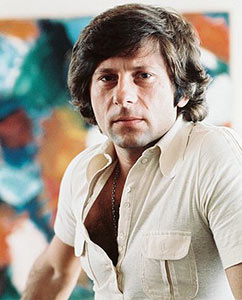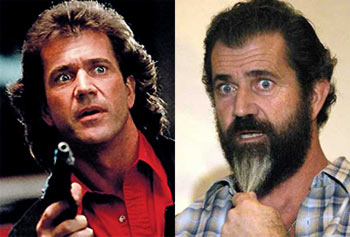The Art or the Crime?
Published on January 30th, 2010 in: Culture Shock, Movies |By Jesse Roth
The arrest of director Roman Polanksi in the fall of 2009 on a decades-old arrest warrant stirred up quite a bit of controversy on many fronts. For some, it was the unexpected but welcome capture of a convicted sexual predator, allowed to run free in Europe for far too long. Others, particularly those in the Hollywood community, were quick to defend one of their own on charges they felt were unwarranted. They wanted Polanski to be free to escape his troubled past, allowed to continue to perfect the craft that made him famous.
As the debate raged on, some brought up the idea that people should boycott the films of Polanski and the actors that supported his scandalous freedom fight. In the eyes of these protestors, the viewing and enjoyment this man’s films meant supporting the actions of a child molester.

Roman Polanski then
My first memories of Roman Polanski involved episodes of shows like E!’s True Hollywood Story, where the minor facts of the director’s early life and career took a backseat to the scandal. For years I simply knew him as the skeezy director that slept with a 13-year old girl.
As I grew older and became more interested in classic films and great directors, I found that I was able to forget about Polanski’s crime enough to sit down and take in masterpieces like Chinatown, and his contemporary award-winner The Pianist. Though his crimes were no less disgusting in my eyes than they were in those of the protestors, I found that I could still enjoy his creations; separating the man from his art.
When actors, directors, and artists of other mediums commit terrible crimes or other social offenses, we tend to have that moment where we feel unable to forgive them. How can we possibly support the work of someone so morally reprehensible? How can we possibly distinguish the two? More times than not, we are able to. Time is usually a major player.
Years before I even knew who Roman Polanksi was, I had similar feelings about Woody Allen. Always a favorite in the Roth family, as a young girl I was introduced to his sillier films such as Take the Money and Run. I fell in love immediately. The humor spoke to me and I even felt a little grown-up being able to like a director so revered by those much older than I was.
Not long after my discovery however, the scandal started. Headlines about Allen’s upcoming movies were replaced with salacious stories about his inappropriate relationship with daughter Soon-Yi Previn and the dissolution of his partnership with actress Mia Farrow. For the longest time, these indiscretions were all I could think about when the name “Woody Allen” came up. Much like my experience with Polanski, I found that the passing of time, as well as the maturity that comes with getting older and slightly wiser, allowed me to suspend my knowledge of the reality to enjoy the world Allen presented in his films.
Though I certainly do not condone his actions, I can still embrace the messages of his films, particularly Annie Hall and Husbands and Wives. After all, I’m buying into the Allen persona of his movies and not necessarily the one that exists when the movie ends (which, oddly enough, has been shown to be vastly different in television interviews and documentaries such as Wild Man Blues).
Over the years, scandals (or at least ordinary yet damming information) involving the lives of some of my favorite entertainers have forever colored my view of them. But each and every time, I found myself able to move past it. Sean Penn’s jerky persona and overt politics did not make his performance in Milk any less incredible. The Michael Richards that showed his true colors in a fit of anger at a nightclub was not the Cosmo Kramer that cracked me up on Seinfeld. Lewis Carroll and Pete Townsend are still incredible in their respective fields even as revelations of their personal life tended to make people think twice about their support of what they have done for a living.

Mel Gibson, then and now
Yet with everything in life, there is an exception to the rule. There will always be that one person whose personal indiscretions manage to forever ruin their work for a fan. Mel Gibson is just that person. I grew up absolutely in love with him. His interviews showed him to possess a wonderful sense of humor, and his flaws (which in one interview as a child were shown to be merely his inability to give up smoking long-term), made you smile more than cringe. Even as I got older, when I learned of his ultra conservative politics and strict Catholic beliefs, I was still able to be a fan. After all, why did those things matter when Lethal Weapon cracked me up and The Year of Living Dangerously enraptured me?
Within a two-year period, it would all start to matter. First it was The Passion of the Christ and its archaic, hateful message regarding Jews and their supposed involvement in the death of Jesus. Not too long after, there was the infamous arrest. The DWI and the vile statements that spewed from Gibson’s mouth blamed his personal failings and current predicament on an entire religion and culture—one I happened to be a part of. Though not a religious person and with a sense of humor about my background, I found Gibson’s comments (and the last two years of news regarding his career and life) to be too much to take.
To this day, I simply cannot sit down and enjoy one of his movies. Maybe it was the release of The Passion, combined with his off-the-set actions, that made it impossible to separate the man from his art. Or maybe it was the fact that as a part of the group he was attacking, I felt personally assaulted. In either case, it still felt so hypocritical and overdramatic on my part. Why could I not move past this, yet continue to support other degenerates with amazing talents?
If anything, my experience with Gibson helped me empathize with those that simply could not separate the artists from their art. Though zeroing in on the personal faults of every artist would leave us with little to look at, there are simply some crimes that we personally cannot forgive. Whether it’s that personal connection or simply a more stringent view on the far-reaching grasp of morality, some people deem it necessary to boycott in order to stand up for themselves and their beliefs. At the same time, we cannot fault others, or ask others to share our beliefs, when we all have our different ideas of when reality bleeds into art.
For another viewpoint on the Roman Polanski issue, please read filmmaker Allison Anders’ excellent piece, titled “Art Is Not Enough.”
2 Responses to “The Art or the Crime?”
January 31st, 2010 at 12:16 am
This is a pretty good article. I’m not sure if the Woody Allen comparison is entirely apt, since, creepy-as-hell though it was, it was consensual, where Polanski straight-up raped her. But the point isn’t about that, and it stands, so, yeah. I guess that’s a little bit of a derail!
For me — I think I’d rather boycott Polanski’s films by not buying ’em or seeing them in theaters. I think Netflixin’ is OK. (Though, to be honest, for me, it’s moot, since, I, ahm, don’t really care for his films. Even back when I thought it was a consensual thing due to the term “Statutory Rape”, which still irks the hell out of me.)
Also: Mel Gibson makes me sad. I wasn’t really a fan, but to see him go down the tubes so hard is weird. A friend of mine would sometimes carpool to school with his kids and such. From what she said, he seemed nice then. (Didn’t call her “sugartits” or NOTHIN’!) So I wonder if it’s some sort of weird breakdown.
February 4th, 2010 at 10:11 am
As for Woody Allen, it may have been technically consensual, but who knows what kind of mental and emotional manipulations may have taken part? It definitely borders on abuse and certainly connotes abuse of POWER, in my opinion.
I am very troubled and angry about the Polanski issue. For my own personal reasons, I can relate to the need for justice to be served and the constant cries of “But he’s a really good guy!” just irk me even further.
I also think back to when the Manson murders first happened and a lot of blame was placed on Polanski himself, like the accusations that he brought on the situation by making weird movies, hanging out with the wrong crowd, dabbling in the occult, etc. Not to justify or excuse his behavior, but a lifetime of tragedy has to really warp a person, and it’s a shame that no one close to him called him out on his bad behavior all these years (as I’m sure there was more of it that we don’t know about).
LLM
Time limit is exhausted. Please reload the CAPTCHA.